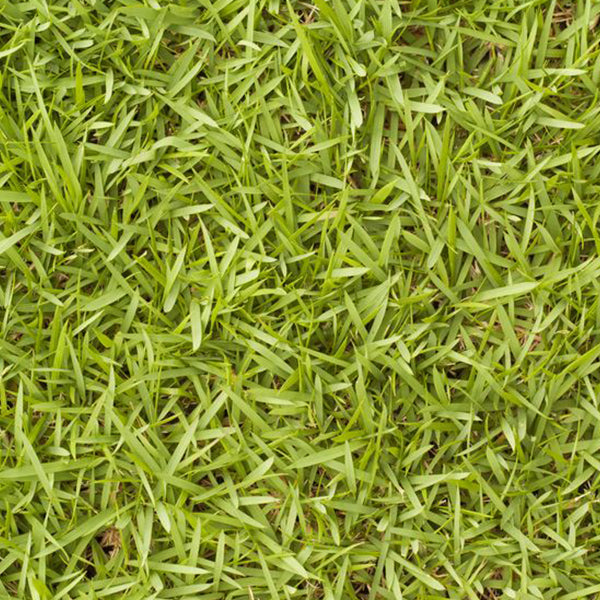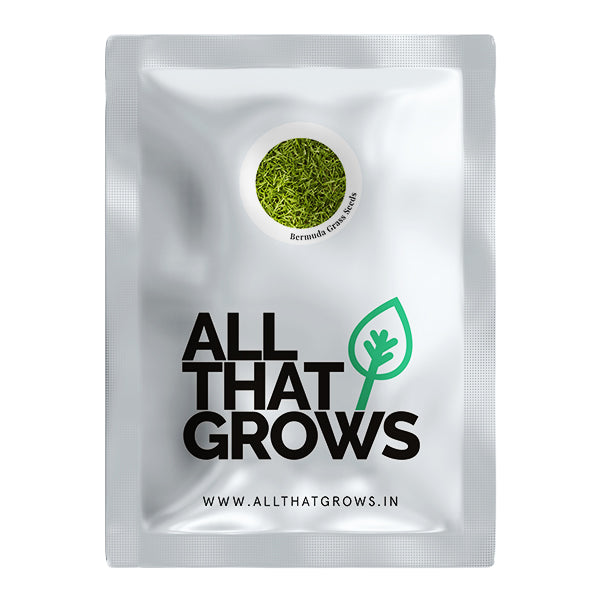



- SOWING
TIMEMarch to May
- Sowing
DistanceDense and Uniform sowing (2 KG/1000 sq ft for new lawns and 1 KG/1000 sq ft for existing lawns)
- Fruit
WeightNA
- Fruit
ShapeNA
- Days to
maturity30 to 40 days after germination for first mowing
- Details
- How to sow
- Reviews
Create lusciously green lawns with our Bermuda grass seeds. An ideal summer season grass, bermudagrass is revered for its heat and drought tolerance in warm summer months. Bermuda grass can be grown as lawn or turf grass since it can take heavy plying and revives from any damage quickly. Bermuda grass will require slightly sandy soils with good drainage to grow well. Since bermudagrass is a perennial warm-season variety, it will be at its most vigorous growth during the hot summer months and will not do well during the winters. During winters, bermudagrass will turn somewhat brown and become dormant. Bermuda grass grows faster than any other warm-season grass variety since it spreads through both the above-ground stolons and below-ground rhizomes. Since bermudagrass can endure low-mowing height, it’s quite popular in golf courses, athletic fields etc.
Planting instructions
Prepare the soil by raking and removing debris from the chosen area. It’s also a good idea to add some nitrogen rich organic fertilizer like chicken coop manure, alfalfa, and cottonseed meal before planting. Spread the seeds evenly and densely on the area with the help of a seed broadcaster or manually. Once the seeds have been spread, use a rake to lightly cover the seeds with the soil around them. Do not bury the seeds deeper than ¼ inches or you’ll face germination issues since grass seeds require adequate light to germinate. Water thoroughly. You can also add bermuda grass seeds to an existing lawn to fill in the bare areas by overseeding. Planting method will be the same as for a new lawn.
Growing Requirements
pests & diseases
Though bermuda grass is largely pest and disease resistant, it is still susceptible to a number of fungal diseases like brown patch, leaf spot, spring dead spot, and fairy rings. This can happen due to poor soil drainage and overwatering. Make sure your soil has good drainage before planting to avoid this. In addition, some insects like crickets, beetles, and grasshoppers may accompany you in your lush green lawn. Bermuda grass grows quickly, hence some insects feeding on it’s grass blades would not be a problem.
soil
Loose sandy soil mixed with fine manure and good drainage is ideal for growing bermuda grass seeds.
spot
Direct sunlight will contribute to the germination and growth of bermuda grass. Hence it’s best to grow it in full sun.
temperature
Ideal soil temperature for growth of bermuda grass ranges between 15 to 22℃.
watering
Newly planted seeds will require very frequent watering, about two times a day. Once seeds have germinated, reduce watering to once a day. Once the grass blades have reached the height of 1-2 inches, water only when the soil feels dry on touch.
how to harvest

Customer Reviews
The productiveness of any seed we sell is subject to your local climatic conditions*, the sowing method you adopt, and your commitment to the planting process. We give no warranty, expressed or implied, and are in no way responsible for the produce.
Please note that all our seasonal recommendations/ sowing information is as per the local climatic conditions. *For more information on the optimum conditions required for growing seeds in your region, please contact us at, hello@allthatgrows.in or Whatsapp us at, +91 8544865077
Questions & Answers
Have a Question?
Be the first to ask a question about this.




Bermuda Grass Seeds
Seed Type : Non-Hybrid, Open Pollinated and Non-GMO
SOWING TIME : March to May
Height : 1-2 inches
Blade : Pointed and sharp blades
Colour : Deep Green
Texture : Dense
Water : Frequently
Grow this with
Create lusciously green lawns with our Bermuda grass seeds. An ideal summer season grass, bermudagrass is revered for its heat and drought tolerance in warm summer months. Bermuda grass can be grown as lawn or turf grass since it can take heavy plying and revives from any damage quickly. Bermuda grass will require slightly sandy soils with good drainage to grow well. Since bermudagrass is a perennial warm-season variety, it will be at its most vigorous growth during the hot summer months and will not do well during the winters. During winters, bermudagrass will turn somewhat brown and become dormant. Bermuda grass grows faster than any other warm-season grass variety since it spreads through both the above-ground stolons and below-ground rhizomes. Since bermudagrass can endure low-mowing height, it’s quite popular in golf courses, athletic fields etc.
Seed Type : Non-Hybrid, Open Pollinated and Non-GMO
SOWING TIME : March to May
Height : 1-2 inches
Blade : Pointed and sharp blades
Colour : Deep Green
Texture : Dense
Water : Frequently
- SOWING
TIMEMarch to May
- Sowing
DistanceDense and Uniform sowing (2 KG/1000 sq ft for new lawns and 1 KG/1000 sq ft for existing lawns)
- Fruit
WeightNA
- Fruit
ShapeNA
- Days to
maturity30 to 40 days after germination for first mowing
Planting instructions
Prepare the soil by raking and removing debris from the chosen area. It’s also a good idea to add some nitrogen rich organic fertilizer like chicken coop manure, alfalfa, and cottonseed meal before planting. Spread the seeds evenly and densely on the area with the help of a seed broadcaster or manually. Once the seeds have been spread, use a rake to lightly cover the seeds with the soil around them. Do not bury the seeds deeper than ¼ inches or you’ll face germination issues since grass seeds require adequate light to germinate. Water thoroughly. You can also add bermuda grass seeds to an existing lawn to fill in the bare areas by overseeding. Planting method will be the same as for a new lawn.
Growing Requirements
pests & diseases
Though bermuda grass is largely pest and disease resistant, it is still susceptible to a number of fungal diseases like brown patch, leaf spot, spring dead spot, and fairy rings. This can happen due to poor soil drainage and overwatering. Make sure your soil has good drainage before planting to avoid this. In addition, some insects like crickets, beetles, and grasshoppers may accompany you in your lush green lawn. Bermuda grass grows quickly, hence some insects feeding on it’s grass blades would not be a problem.
soil
Loose sandy soil mixed with fine manure and good drainage is ideal for growing bermuda grass seeds.
spot
Direct sunlight will contribute to the germination and growth of bermuda grass. Hence it’s best to grow it in full sun.
temperature
Ideal soil temperature for growth of bermuda grass ranges between 15 to 22℃.
watering
Newly planted seeds will require very frequent watering, about two times a day. Once seeds have germinated, reduce watering to once a day. Once the grass blades have reached the height of 1-2 inches, water only when the soil feels dry on touch.
how to harvest



 Sign In
Sign In








